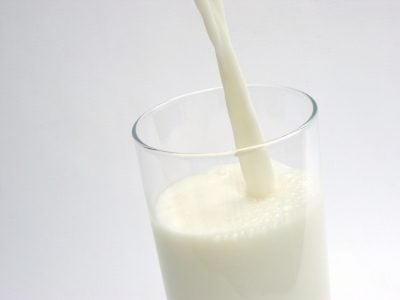Ask Best Health: What’s the deal with milk substitutes?
Grocery stores shelves are packed with substitutes for cow’s milk. Whether you’re avoiding lactose or dairy or just looking for something new to try, here’s the lowdown on milk alternatives

Source: Web exclusive: May 2011
There’s a whole host of milk substitutes’some quite rich and delicious tasting’for those who can’t or prefer not to drink cow’s milk. “I encourage clients to enjoy a variety of milk sources in their diet," says Nicole Fetterly, a registered dietitian in Vancouver. "Nobody would rely on only bananas for their fruit, so why rely on only one source of milk?” Here are the details on some common cow’s milk alternatives. Got a favourite? Let us know in the comments.
Goat’s milk
"This is the milk substitute most similar to cow’s milk, probably because it too comes from an animal," says Fetterly. "If it isn’t in your grocery store, it soon will be." Goat’s milk is popular because it is more easily tolerated in those people who struggle with the protein in cow’s milk (this is different from lactose intolerance’goat’s milk does contain lactose), and it features comparable levels of protein and calcium.
Goat’s milk is a little tangier tasting than cow’s milk (just as goat’s cheese has a slight tang), which may be a nice complement when it’s used as a substitute in baking (such as in a savoury crepe). If you’re new to goat’s milk products, Fetterly suggests using goat’s cheese as an introduction’try using a creamy chevre on a salad or mixed in with pasta and tomato sauce instead of ricotta cheese.
The downside: Goat’s milk is usually available only in whole milk form with a fat content of 3.5 percent, says Fetterly. ‘So that’s great for kids who can’t tolerate cow’s milk, but adults or anybody with weight issues will need to note that it is double the fat of skim cow’s milk.’
Soy milk
The most common cow’s milk alternative is soy milk, says Fetterly. Because it is made from soybeans (soybeans are moistened and then ground up with water), it does not contain the troublesome sugar, lactose, that naturally occurs in cow’s milk and causes an intolerance for some. Soy milk is also popular with people who prefer to avoid animal products for ethical or moral reasons.
Generally, Fetterly says that soy milks are a good although slightly lower source of protein than cow’s milk, and that most are fortified with calcium and vitamin D (but it is important to check the label). The fat content is more comparable with a 1 percent cow’s milk, she adds, but it contains lower saturated fat because it does not come from an animal. Manufacturers are also developing new types of soy milk, such as soy cream. Soy milk is a safe substitute in baking.
The downside: ‘The flavoured soy milks can contain a lot of sugar,’ says Fetterly. While that’s obvious when you are buying chocolate soy milk, for example, most people don’t expect sugars in the vanilla, she adds. ‘The best choice is the unsweetened kind. Also look for clean soy milks. You want the ingredients to just be soybean, water and some vitamins, not a bunch of other additives”the types kept in the refrigerator section of your grocery store will generally have less preservatives than those that are shelf-stable. The taste of soy milk may need some getting used to; however, manufacturers are getting better at making soy milk creamy tasting like cow’s milk. Finally, soy allergies are not uncommon, so if you’ve never eaten soy it is a good idea to test a very small amount.
Rice, almond and hemp milk
These varieties are increasingly available in grocery stores and even coffee shops. Each is made from its respective namesake ground with water and other ingredients (rice is made from brown rice; hemp from hemp seed). Bonus: nut and seed milks can easily be made at home in a good blender. These varieties are fairly low in fat, and especially saturated fat, says Fetterly. Almond milk’s taste profile most closely resembles cow’s milk. Rice milk is similar to soy milk. Hemp milk has a creamy, nutty taste.
The downside: These milks are not a good source of protein, so you may need to compensate with additional sources of protein in your diet. Fetterly adds that you should try to avoid rice, almond or hemp milks that are flavoured or have added sugar to prevent excess calorie consumption.
Coconut milk
This brand-new type of milk made with water and coconut milk, not to be confused with the straight coconut milk available in cans, is available on natural food store and some grocery store shelves, according to Fetterly, and is popular for its smooth texture and mild taste. ‘Coconut milk contains a high proportion of medium triglycerides, a type of fat that is metabolism boosting,’ Fetterly adds.
The downside: Coconut milk typically contains a high amount of saturated fat, although there is great debate in the scientific community over whether plant-based saturated fats such as found in unprocessed coconut products should be labelled as "bad" the same way that animal-based saturated fats are. For now, experts advise you limit intake if you are at risk of heart disease. Make sure you read the label before purchasing.
Watch for the D
Note that while cow’s milk is fortified with vitamin D, not all milk substitutes will be fortified in the same way’make sure to check the label. Fetterly suggests fortifying with a D supplement rather than depending on any kind of milk for your intake; check with your doctor for the right option for you.
Don’t miss out! Sign up for our free weekly newsletters and get nutritious recipes, healthy weight-loss tips, easy ways to stay in shape and all the health news you need, delivered straight to your inbox.




